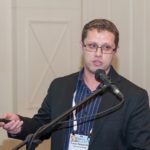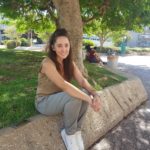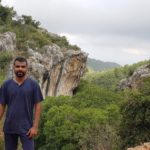 Roman Dobrovetsky |
 Kristina Gruchik |
Introducing the researchers:
Roman Dobrovetsky was born in Uzbekistan in 1979. At age of 12, his family moved to Israel. After finishing school in 1998, he joined the army. Soon after the army, he started his BSc in Technion. In 2005, he joined Prof. Apeloig’s group for his PhD studies in the field of silicon chemistry. After finishing his PhD, he moved to Toronto to work with Prof. Stephan, where he did his research in the field of frustrated Lewis pairs and Lewis acid catalysis. In 2015, he moved back to Israel to start his independent career at Tel Aviv University. His research interests are in the main group chemistry and transition-metal free catalysis.
Kuldeep Jaiswal was born in 1988 in Sonipat/India studied chemistry at the Hindu college Sonipat (2005-2008) and at the Kurukshetra University Kurukshetra (2008-2010) and completed his Ph.D. in Inorganic Chemistry under the supervision of Prof. Sanjay Singh (2012-2016) at the Department of Chemical Sciences, Indian Institute of Science Education and Research Mohali (India). His Ph.D is supported by a scholarship of the University Grants Commission (2012-2016). Kuldeep then joined the laboratory of Prof. Chunming Cui (State Key Laboratory of Elemento-Organic Chemistry, Collaborative Innovation Center of Chemical Science and Engineering, Nankai University, China) as a postdoctoral researcher (2016-18), and later joined Prof. Roman Dobrovetsky group (2018 onwards) at the School of Chemistry at Tel Aviv University.
Kristina Gruchik was born in Magadan, Russian Federation. Received her BSc and MSc from Tel-Aviv University. Currently, she is pursuing her PhD at the same institution under the supervision of Prof. Roman Dobrovetsky, exploring the chemistry of the main group elements.
What inspired your research in this area?
I’d say that what inspires me the most is a scientific curiosity. Questions like can we do chemistry that transition metals do with non-transition metal based complexes are very interesting to me.
What do you personally feel is the most interesting/important outcome of your study?
Actually, for me the most interesting and surprising in this chemistry was the fact that the Zn complex that we made was air- and moisture stable. This of course makes it more convenient for use in catalysis.
What directions are you planning to take with your research in future?
We’re now looking into other ligands at Zn-center and other main group elements and at other catalytic hydroelementation reactions that we can do with these new catalysts.
Read the full article: An air-stable, Zn2+-based catalyst for hydrosilylation of alkenes and alkynes
See the other articles showcased in this month’s Editor’s Collection
See every article in the full Editor’s Collection











